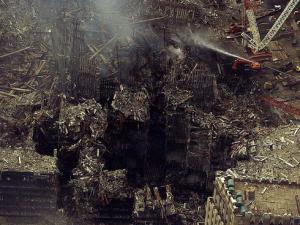9/11 Saudi connectionNewly declassified documents reveal “chilling” details about 9/11 Saudi connection
Investigators describe the details revealed in a series of declassified memos relating to the 9/11 attacks as “chilling”: These details offer information about Saudi support for the 9/11 terrorist attacks. A former 9/11 Commission staff member said the newly released material largely duplicates the classified 28-section of the 9/11 Commission report, a section which has not been made public. Former Secretary of the Navy, John Lehman, who was a member of the 9/11 Commission, said that as many as six Saudi officials could have supported the 9/11 hijackers

Immediate aftermath of the 9-11 attacks on the World Trade Center // Source: commons.wikimedia.org
Investigators describe the details revealed in a series of declassified memos relating to the 9/11 attacks as “chilling”: These details offer information about Saudi support for the 9/11 terrorist attacks.
A former 9/11 Commission staff member told the Guardian that the newly released material largely duplicates the classified 28-section of the 9/11 Commission report, a section which has not been made public.
The Guardian reports that Fahad al-Thumairy, a 32-year-old Imam and former Saudi diplomat deported from the United States in 2003 because of terrorist links, was questioned in Saudi Arabia by members of the 9/11 Commission in February 2004.
A member of Commission staff told the newspaper that “it was so clear Thumairy was lying.”
“It was also so clear he was dangerous.”
The investigators described the scene as “chilling”.
Al-Thumairy denied any knowledge of Omar al-Bayoumi, a Saudi national who befriended two of the 9/11 hijackers, even after he was presented with evidence of dozens of phone calls between them.
The document states that when al-Thumairy was subjected to more aggressive questions during his interrogation, “his posture changed noticeably.”
Al-Thumairy crossed his arms, sat back in his chair, and relied more heavily on the interpreter when questioned about his connections to two Saudi hijackers who had lived in southern California before 9/11.
The interviews were conducted between 2002 to 2004 by investigators for the 9/11 Commission, and have now been published by the National Archives.
According to notes from an interview, members of the Islamic Council of the Saudi government said: “Funds were probably misused. Saudis have an obligation to give to charity. People don’t ask questions about where the money goes.”
“We used our money. But we did not want our money to be used to attack the USA, or to be turned against us.”
An interview with al-Bayoumi is also listed in the memos, in which he “agreed that he had some telephone contact with al-Thumairy, which involved discussion of [al-Bayoumi’s] questions on religious matters”.
The document states that al-Bayoumi “considered al-Thumairy his religious advisor,” but denied that he was ever his teacher, and “expressed surprise that he might have held a position at the Consulate.”
In to released documents, both al-Thumairy and al-Bayoumi deny any connections to terrorists.
Former Secretary of the Navy, John Lehman, who was a member of the 9/11 Commission, said that the classified 28-page section of the report shows that as many as six Saudi officials could have supported the 9/11 hijackers.
Those individuals worked for the Saudi Embassy in the United States, Saudi charities, and the Saudi government-funded King Fahd Mosque in California, Lehman said.
The 9/11 Commission’s report concluded, however, that “no evidence that the Saudi government as an institution or senior Saudi officials individually funded” al Qaeda.
Lehan said: “Our report should never have been read as an exoneration of Saudi Arabia.”
The Saudi government has said it was “wrongfully and morbidly accused of complicity“ in the attacks.
The George W. Bush administration rejected calls for publishing the classified part of the report, saying publication would reveal “sources and methods that would make it harder for us to win the War on Terror.”
